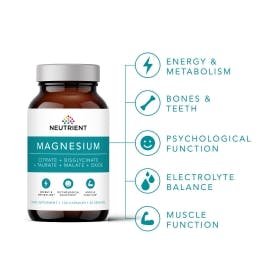Magnesium and sleep: everything you should know
As you might have heard, Neutrient Magnesium recently won the Silver Award for Best Sleep product in Your Healthy Living Awards 2023 and we couldn´t be happier! As we continue to celebrate, we want to share the link between Magnesium and sleep and give you some tips to select the best magnesium supplement for sleep.
Magnesium for sleep
Magnesium is nature's mineral sedative, helping to decompress the nervous system and regulate melatonin, which guides sleep-wake cycles in your body. If your job, relationship or lifestyle has left you feeling tired, overwhelmed and troubled then magnesium could be the perfect restorative elixir. Magnesium is known by naturopaths and nutritional therapists as nature’s sedative as it’s capable of offering comfort and support during challenging times or when your lifestyle has become busy and demanding. This mineral’s calming effects are due to the way magnesium contributes to normal psychological function and the normal functioning of the nervous system.
Magnesium for sleep and anxiety
When it comes to shaping your mood, magnesium is an important cofactor for the production of the happy brain hormone, serotonin. When serotonin is low, your mood could dip, and anxiety may become more pronounced. Magnesium’s relaxing properties are attributed to its supportive relationship with GABA, a neurotransmitter that helps melt stress away, calm down nerve activity and encourage a restful night. If a decent night’s sleep is eluding you because your mind is overstimulated, whirling with thoughts, making you restless and unsettled, then it’s time to add magnesium to your bedtime routine.
Evidence suggests that magnesium may also help when feeling overwhelmed, tense and uptight by supporting the nervous system and psychological function, encouraging the body to start unwinding and returning to a state of balance. Finally, ongoing stress and tension tends to quickly deplete magnesium levels.
What types of Magnesium are there?
There are lots of different types of magnesium and some are far more effective than others, here are some examples:
• Magnesium malate: top of the list for muscles and energy systems
• Magnesium bisglycinate: best absorption rate and a good all-rounder
• Magnesium taurate: used in clinical studies researching the nervous system and brain
• Magnesium citrate: good for general magnesium support and energy
• Magnesium salts (oxide, carbonate, chloride): have lower absorption rates but some contain an impressive level of elemental magnesium.
Combining four chelates, like magnesium taurate, bisglycinate, malate and citrate, helps improve absorption by transporting magnesium into the body using four different transport channels. Once absorbed, the four chelates offer a VIP express service, delivering magnesium to areas of the body that other standard forms of magnesium struggle to reach.
When to take magnesium for sleep
There are a variety of ways that you can use magnesium for sleep but we encourage you to take your magnesium supplement at different times of the day so you can discover what works best for you and your lifestyle. Some people find that magnesium supplements for sleep work best when taken just a few hours before bedtime. However, if you have a demanding job or busy schedule or are experiencing a stressful life event then you may find that taking your magnesium supplement in the morning might be best for you.
How to choose a Magnesium supplement?
Choosing a potent, high strength, fast acting, magnesium supplement can keep magnesium levels topped up in times of unsettled sleep. Avoid magnesium supplements that contain magnesium carbonate as these tend to be poorly absorbed and may trigger digestive discomfort. Instead look for a magnesium supplement that contains four magnesium chelates (bisglycinate, taurate, citrate and malate) as these have higher absorption rates, are gentle on the gut and reach areas of the body that standard forms of magnesium struggle to reach.
How much magnesium should you consume?
Reports from the World Health Organization reveal that 60% of Euripeans do not achieve the daily dietary intake for magnesium, indicating widespread deficiency.
Adults require 375mg of magnesium a day. Eating more green leafy vegetables, nuts and seeds helps boost dietary magnesium.

Food Sources of Magnesium
When it comes to magnesium it’s worth remembering that foods which are naturally high in fibre also tend to be high in magnesium. Another magnesium guideline is that green leafy vegetables, nuts and seeds score high on the magnesium charts.
• Vegetables - spinach, kale, chard, cabbage
• Salad greens - lettuce, watercress, rocket
• Nuts - almonds, cashews, peanuts, walnuts
• Seeds - chia, pumpkin, sesame, sunflower
• Cereals - brown rice, oats, quinoa, buckwheat
• Legumes - soya, back, pinto, lentils, chickpeas
• Fruit - avocado, banana, dried figs
• Fish and meat - halibut, salmon, chicken, beef
• Other - yoghurt, dark chocolate, seaweed, sea salt
Magnesium Health Benefits:
Normal functioning of the nervous system
Normal psychological function
Normal energy-yielding metabolism
Reduction of tiredness and fatigue
Normal muscle function
Maintenance of normal bones and teeth
Electrolyte balance
Normal protein synthesis
Process of cell division
There is plenty of research that shows that magnesium is involved in helping mind and muscles relax and offer support to the nervous system. This mineral may also be involved in mechanisms that help regulate the body clock and may act as a cofactor for neurotransmitters that influence mood and sleep.
Susie Debice – Food Scientist and Nutritionist for www.neutrient.com with Neutrient Magnesium

.png?auto=format&q=45&w=848&trim=auto&git=crop)


